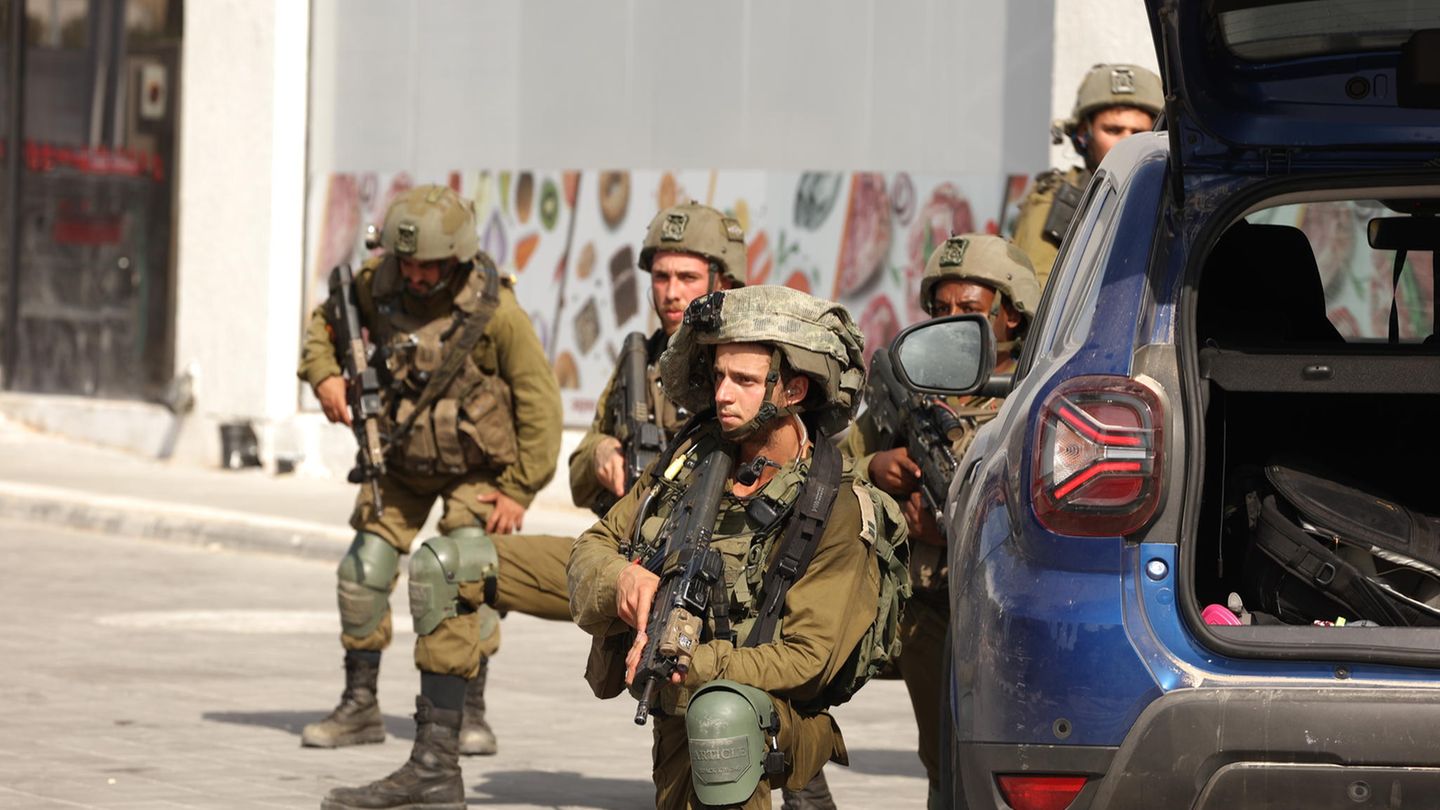Hamas has taken dozens of civilians and soldiers hostage. How will Israel respond to this? Middle East expert Guido Steinberg says: There are no good alternatives.
The radical Islamist Hamas fires thousands of rockets into Israel, terrorist commandos from Gaza invade Israel, murder and take hostages. Israel sees itself at war. How do you rate that?
This attack represents a new dimension. Hamas rocket attacks have been going on for years. The new thing is that Hamas units have advanced into Israeli territory. They are able to stay there for a while, have killed many Israelis and also taken civilians and soldiers hostage. That is quite surprising.
Yesterday evening the number of 52 hostages, including Israeli military personnel, was circulating, some of whom had been kidnapped from Israel to the Gaza Strip.
As surprised as the Israelis were and in view of the videos online, it can be assumed that the numbers are correct and perhaps even higher. In any case, there are a lot of hostages. The news of the capture of an army general also seems to be confirmed.
Israel’s security apparatus was apparently taken completely by surprise. The border fences with Gaza go deep underground and are equipped with cameras and sensors – how could this happen?
Through arrogance, complacency and negligence. The Israelis were surprisingly poorly positioned on the borders with Gaza. The attackers’ tactics are nothing new. The Israelis have been discussing attacks of this kind for months, but from Lebanon, where Hezbollah operates. They were not at all prepared for something similar to come from the Gaza Strip in the south. This is negligent.
Did Israel’s secret services oversleep the military terror operation?
We are dealing with several hundred Hamas fighters, all of whom are highly motivated and very strongly ideological. They are used to acting in secret. That’s why I’m not so sure that the Israeli services should be the main target of criticism. When you’re dealing with an opponent as professional as Hamas, it’s entirely possible that you don’t get the information you need beforehand. What is actually incomprehensible is that the border fence and the places on the Israeli side were not better protected. It was negligence, especially on the part of the army, that the protective measures were obviously not correct at all.
“Citizens of Israel, we are at war,” Prime Minister Netanyahu said in an address to the population. How will Israel react now?
The air raids have begun. A bigger action is coming. But the big question is whether there will also be a larger ground operation. The Israelis now have to weigh things up. If they invade the Gaza Strip, they will endanger the life and limb of the hostages. If they do not invade, the incident has the potential to become a major defeat for Israel.
During the eleven-day military operation two and a half years ago, Israel massively bombed the densely populated Gaza Strip, including the Hamas tunnel system – but there was no ground offensive.
In my view, there are no good alternatives for Israel. If they don’t invade, there will be lengthy negotiations and, ultimately, a disadvantageous prisoner exchange – combined with all the domestic political discussions that this entails. Hamas has kidnapped young girls, children and old women. The first films are already appearing that show hostages being mistreated. Murders on camera could follow and negotiations could last for months or years. The alternative is a ground offensive with an uncertain outcome, in urban territory with high Israeli army casualties and corresponding civilian casualties on the Palestinian side. Immediately after hostage-taking in the past – such as in the war against Hezbollah in 2006 – Israel has responded with broad military offensives. I expect that the Israeli government could also decide to attack now.
The hostage issue could prove central to what happens in the next few days?
In my view, the hostage-taking is the great success that Hamas is celebrating here. They have an unknown but not small number of hostages in their power, including not only soldiers, but also female soldiers, older women and children. And we know from the past: This is the Israelis’ Achilles heel. Israeli society expects these hostages to be freed. The price for this is always high; for every Israeli, hundreds of captured Palestinians are freed. And that enormously limits the Israelis’ scope for military action.
Doesn’t Hamas’ brutal actions force Israel’s government to launch a massive counterattack, regardless of the hostages?
If Israel responds with a large-scale offensive, the risk of these hostages being mistreated or even murdered will definitely increase. If the Israeli government decides to forego a major ground operation in consideration of the hostages, talks about a prisoner exchange would begin very soon. And it will end the way it always has, namely that Israel will have to make extensive concessions in order to free a few hostages.
And would the hardliners in Netanyahu’s government approve of that?
Even Israeli conservatives and right-wingers have supported such exchanges in the past. The desire to get back the living Jewish hostages and the bodies of the dead Jewish soldiers was so great that security policy considerations took a back seat. And I assume that it will remain that way in the future.
There has been great unrest in Israel itself for months, and society appears to be divided. The right-wing government alliance relies on right-wing extremist and ultra-religious parties, and opposition members fear for democracy. And two million Arabs live in the country. A powder keg?
Hamas’ hope that the Palestinians in Israel will show solidarity with it is completely exaggerated. I think the Israelis will now rally behind the flag. And I very much hope that the domestic political conflict over judicial reform will then become less severe.
Why did the radical Islamists strike now of all times?
First of all, Hamas wanted to take advantage of the 50th anniversary of the October War, or Yom Kippur War. But the deeper cause is the negotiations between the USA, Saudi Arabia and Israel about normalization or even a peace agreement between Saudi Arabia and Israel. That was the number one topic in Israel in recent weeks – but also among Palestinians. Their concern is that they play little role in such an agreement. And Hamas fears that it will be pushed even further to the fringes of the political spectrum because it is not involved at all. The attack is Hamas’s indication – perhaps also Iran’s indication – that peace between Israel and Saudi Arabia has opponents among the Palestinians.
Iran’s government congratulated Hamas on a “turning point in the armed struggle against the Zionists.”
That was expectable. The action would not have been possible without Iranian support. Hamas has been receiving training aid from Hezbollah and Iran for around 30 years, and rocket and missile components for almost two decades. So if Hamas can achieve success here, then it is also a success for Iran.
How do you interpret the reactions in the Arab world?
They are divided into two parts. The forces loyal to Iran in Iraq, Syria and Lebanon blame the Israelis and celebrate Hamas. The Qataris officially position themselves in the middle, but if you watch Al Jazeera in Arabic, Qatar’s position appears more Hamas-friendly. In my opinion, what is crucial is how Saudi Arabia reacts. And the government media are very negative about Hamas, they also use the attribute “terrorist”. A very important part of the region – in addition to Saudi Arabia, the United Arab Emirates and other Gulf states – has drawn closer to Israel and sees the terrorist organization Hamas as an enemy. And Saudi Arabia is by far the most powerful Arab state.
Do you think an escalation towards Iran is conceivable?
Conceivable, of course – but only if the conflict actually spreads towards Lebanon. The Israelis have been expecting a similar attack in the north of the country for months. Tensions will rise in the near future because the Israelis naturally hold Iran partly responsible for what happened. However, my impression is that Hezbollah has no interest in entering into arms with the Israelis.
In Berlin the police broke up an anti-Israel gathering last night. Given the situation in Israel, do you expect demonstrations in Germany?
If the conflict lasts for a long time and the Israelis carry out air strikes, there will also be civilian casualties and Israel’s critics here will become loud. There are many Hamas and Hezbollah sympathizers in Germany, and their number is growing. The Muslim Brotherhood also has many friends – and the brothers are on the side of the terrorists. But given the extremely brutal actions of Hamas, such statements will meet with great resistance here in Germany. I hope that the Federal Government will take these events as an opportunity to take more decisive action against Hamas and its supporters.
Source: Stern
I have been working in the news industry for over 6 years, first as a reporter and now as an editor. I have covered politics extensively, and my work has appeared in major newspapers and online news outlets around the world. In addition to my writing, I also contribute regularly to 24 Hours World.




